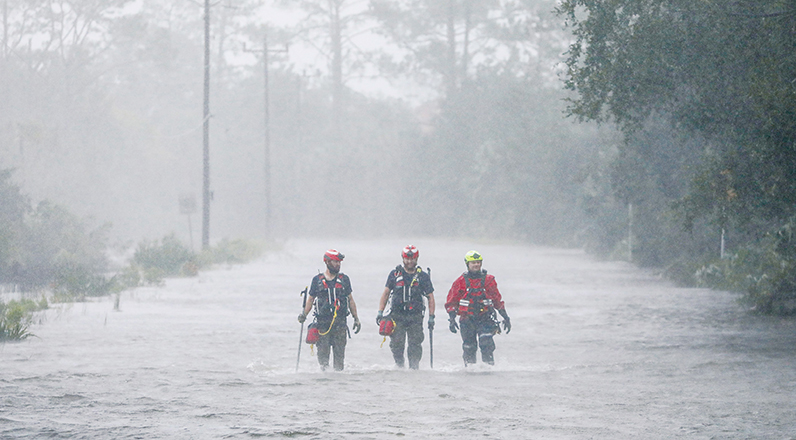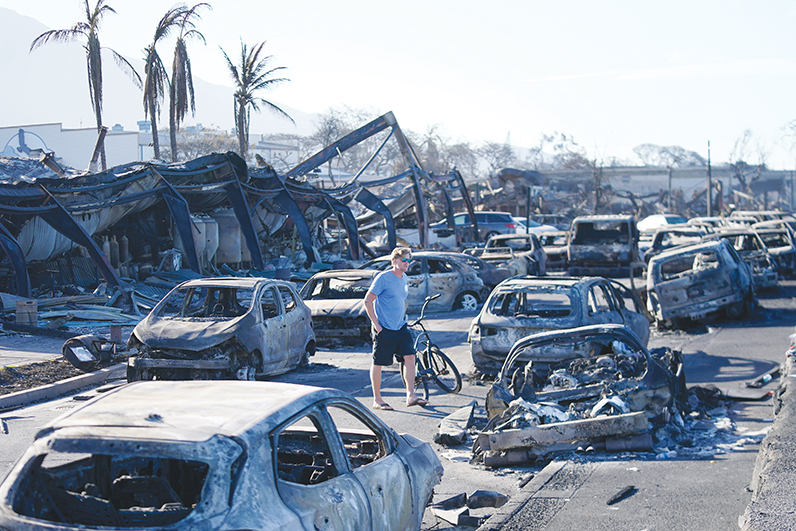
In a dire new statement on the perils of climate change, Pope Francis names health care as one of the areas that will feel its impact.
The pope's exhortation, Laudate Deum, repeatedly refers to the climate crisis and notes that some aspects, such as the increase in ocean temperatures and the decrease in arctic ice sheets, are "already irreversible."
Pope Francis references the concerns he raised in his 2015 encyclical Laudato Si'. That earlier statement presented a broader look at environmental concerns and called for people to engage in a "renewed dialogue" on caring for and preserving God's creation.
"Yet, with the passage of time, I have realized that our responses have not been adequate, while the world in which we live is collapsing and may be nearing the breaking point," the pope writes in the new statement.
He adds: "In addition to this possibility, it is indubitable that the impact of climate change will increasingly prejudice the lives and families of many persons. We will feel its effects in the areas of healthcare, sources of employment, access to resources, housing, forced migrations, etc."
Collective voice
The exhortation came out on Oct. 4, the feast day of environmental patron St. Francis of Assisi.
"Those of us who serve in Catholic health care must use this motivation to push more urgently for changes in how we live and work and heed Pope Francis' call to 'bring about large processes of transformation rising deep with society,'" Sr. Mary Haddad, RSM, president and CEO of CHA, said in a statement. "As a leading ministry of the Church in the United States, we will continue to raise our collective voice to call for bold change in environmental policies and practices that are critical to promoting human flourishing."
If the global health care sector were a country, it would be the fifth-largest greenhouse gas emitter on the planet, according to the nonprofit Health Care Without Harm. The biggest contributor to the global health care carbon footprint is the United States, accounting for 27%, the organization says.
Dr. Rod Hochman, president and CEO of Providence St. Joseph Health, also responded to the pope's message. "At Providence, we believe health is a human right and understand that the effects of climate change are most disproportionately felt by marginalized populations around the world," he said.
Hochman noted that his system is striving to become carbon negative by 2030.
The Catholic Climate Covenant applauded Laudate Deum. The group, which is a collaboration of 20 national Catholic organizations working to reduce environmental harm, said in a statement that it was "particularly moved" by the pope's focus on the climate crisis.

A man walks through wildfire wreckage in Lahaina, Hawaii, in mid-August. The wildfires on the island of Maui left about 100 people dead. Climate change is a key driver in increasing the risk and extent of wildfires in the United States, according to the National Oceanic and Atmospheric Administration. Credit: Rick Bowmer/Associated Press
"Pope Francis' message is a powerful reminder of the values that guide us: respect for the life and dignity of every person, solidarity with the poor and vulnerable, and stewardship of the earth which sustains us all and upon which we are all dependent for our very lives," the group said.
A global breaking point
In
Laudate Deum, Pope Francis calls out the United States, saying its emissions per individual are about two times more than those in China and about seven times greater than the average of the poorest countries. He states that "a broad change
in the irresponsible lifestyle connected with the Western model would have a significant long-term impact."
The pope calls the climate crisis "a global social issue and one intimately related to the dignity of human life." He says people who deny the current evidence of climate change also ignore that "what we are presently experiencing is an unusual acceleration of warming, at such a speed that it will take only one generation — not centuries or millennia — in order to verify it."
Most of the damage has been done in recent years, he points out, with more than 42% percent of total net emissions since the year 1850 produced after 1990. He calls out "great economic powers" who he said are more concerned with the greatest profit in the shortest amount of time rather than the climate crisis.
"I feel obliged to make these clarifications, which may appear obvious, because of certain dismissive and scarcely reasonable opinions that I encounter, even within the Catholic Church," he writes.
Remaining hopeful
In his reflection, Pope Francis expresses hope for agreement among world powers to transition from fossil fuels to renewable energy sources at a climate conference in the United Arab Emirates later this year. He
notes that a summit in 1992 led to the adoption of a U.N. treaty for a framework on climate change.
"This Conference can represent a change of direction, showing that everything done since 1992 was in fact serious and worth the effort, or else it will be a great disappointment and jeopardize whatever good has been achieved thus far," he writes.
Pope Francis waited until the final line of the letter to point out that Laudate Deum means "Praise God."
"For when human beings claim to take God's place," he explains, "they become their own worst enemies."
